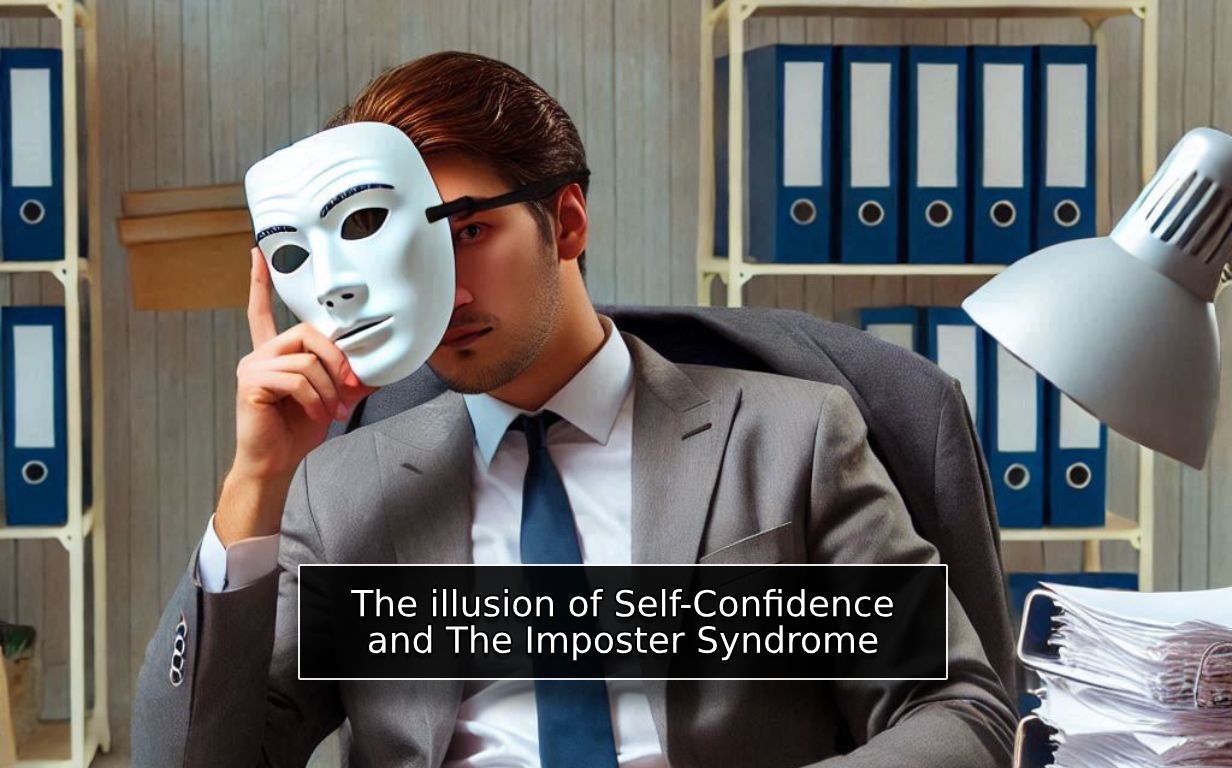The illusion of Self-Confidence and Imposter Syndrome
Are You a Fraud?
Have you ever felt like you don't belong where you are? As if at any moment, someone is going to discover that you're a fraud? If so, you're not alone. Imposter syndrome is a common experience for many people, even the most successful ones.
What is Imposter Syndrome?
Imposter syndrome is the experience of deep-seated insecurity about your abilities, despite evidence of your success. People with imposter syndrome tend to believe that their achievements are due to luck, timing, or fooling others. They feel unworthy of their accomplishments and believe that at any moment, the "real" them will be exposed.
What causes Imposter Syndrome?
One of the main causes of imposter syndrome is the myth of absolute self-confidence. Our society encourages us to be confident in all situations. But the truth is, self-confidence is not a static trait but a dynamic one, changing according to the situation and circumstances.
Self-confidence is an illusion. When we know what to do, it's not self-confidence but knowledge and familiarity with the situation. On the other hand, when we're in a new or uncertain situation, it's natural to feel uncomfortable or anxious. This is a normal bodily response.
Our high expectation to be confident all the time makes us feel like something is wrong with us. When we experience uncertainty, we tend to think that we're not good enough or skilled enough. This, in turn, reinforces the feeling that we're imposters.
When we encounter a new or uncertain situation, our nervous system naturally responds with anxiety. This is an ancient survival mechanism designed to protect us from danger. The problem is that we tend to interpret this anxiety as a sign that we're not good enough or capable.
The Impact of Imposter Syndrome
Imposter syndrome isn't just an unpleasant feeling; it can significantly impact our lives. Its effects can be varied and include:
- Damaged self-esteem: The constant feeling of inadequacy undermines self-esteem and makes it difficult to take on new challenges.
- Fear of failure: The fear of being exposed as a "fraud" causes us to avoid situations where we might fail, thus limiting our opportunities to grow and develop.
- Social isolation: Feeling like we don't belong or are worthy of success can lead us to avoid social or professional connections.
- Depression and anxiety: The worries and doubts associated with imposter syndrome can lead to the development of depression and anxiety.
- Dissatisfaction: Even when we achieve success, it's difficult to feel truly satisfied if we believe it's based on luck or deception.
Examples of behaviors associated with imposter syndrome:
- Workplace: An employee may avoid a promotion for fear of being exposed as incompetent in a higher position. A student may avoid pursuing further education believing they won't meet the demands of a more advanced program. An entrepreneur may delay launching their business out of fear of public failure.
- Personal life: A parent may feel they are not a good enough parent and compare themselves to other parents. A partner may be afraid to trust their partner and suspect they will be betrayed. A person may avoid pursuing their dreams for fear of failure and embarrassment.
How to Cope with Imposter Syndrome
Imposter syndrome is a common experience, but it can be managed. Here are some strategies to help you cope:
1. Recognize and accept the experience:
The first step is to understand that you're not alone. Imposter syndrome is a common experience for many people, even the most successful ones. Recognizing that your feelings are valid can make it easier to cope.
2. Challenge negative thoughts:
Identify and replace automatic negative thoughts with more balanced and realistic ones. For example, instead of thinking "I'm not good enough," try thinking "I have the skills to handle this challenge."
3. Build self-esteem:
Focus on your achievements and accomplishments, and appreciate yourself for your efforts rather than just your results. Remember that everyone makes mistakes and learns from them, and success is a continuous process.
4. Seek support:
Sharing your experiences with friends, family, or a therapist can provide emotional support and reassurance. Sharing your experiences can help you feel less alone and understand that you're not the only one going through this.
5. Seek professional help:
Cognitive Behavioral Therapy (CBT) and Acceptance and Commitment Therapy (ACT) are effective tools for addressing imposter syndrome.
- CBT: This therapy focuses on identifying and replacing negative thoughts with new, healthier behaviors. In CBT, you'll learn how to identify your automatic thoughts, examine their reality, and develop strategies to cope with challenging situations.
- ACT: This therapy helps us accept our thoughts and feelings, even if they are unpleasant, and act in accordance with our values. In ACT, you'll learn how to disengage from your thoughts and focus on meaningful actions in life.
How can these therapies help?
- Developing coping skills: These therapies teach you how to cope with challenging situations and manage your emotions in a healthier way.
- Changing thought patterns: These therapies help you identify and challenge your negative and irrational thoughts, and develop a more balanced perspective.
- Improving self-esteem: By addressing imposter syndrome, you can develop greater self-confidence and believe in your abilities.
- Improving quality of life: These therapies can significantly improve your quality of life by reducing anxiety and depression and improving your relationships.
Remember, imposter syndrome is a common experience, and many people deal with it. With therapy and support, you can learn to manage imposter syndrome and improve your quality of life.
Contact now
Ready to take the first step towards positive change? Contact me now for more information and to schedule an appointment. Whether you prefer in-person sessions in Tel Aviv or virtual meetings via Zoom, my integrated approach of Cognitive Behavioral Therapy (CBT) and Acceptance and Commitment Therapy (ACT) can help you break free from struggles and find greater fulfillment in life. I'll be sure to get back to you as soon as possible. Let's embark on this transformative journey together!
Call Whatsapp 052-2325511
Or fill out the following form.
Can ACT and CBT assist you or your loved ones?
Welcome to my therapy practice, where I offer a powerful combination of Cognitive Behavioral Therapy (CBT) and Acceptance and Commitment Therapy (ACT) techniques. CBT is a goal-oriented, short-term approach that's highly effective for anxiety, depression, low self-confidence, and more. ACT complements CBT, helping you navigate life's challenges and find fulfillment and authentic, happier life.
If you're struggling with anxiety, depression, low self-image, or facing setbacks, CBT combined with ACT may be the key to transforming your life. Break free from the struggle and take a step towards a happier, more fulfilling life.
Contact me today to schedule an appointment and embark on your journey of positive change. You don't have to face it alone; I'm here to support you every step of the way. Let's work together to create the life you deserve!





